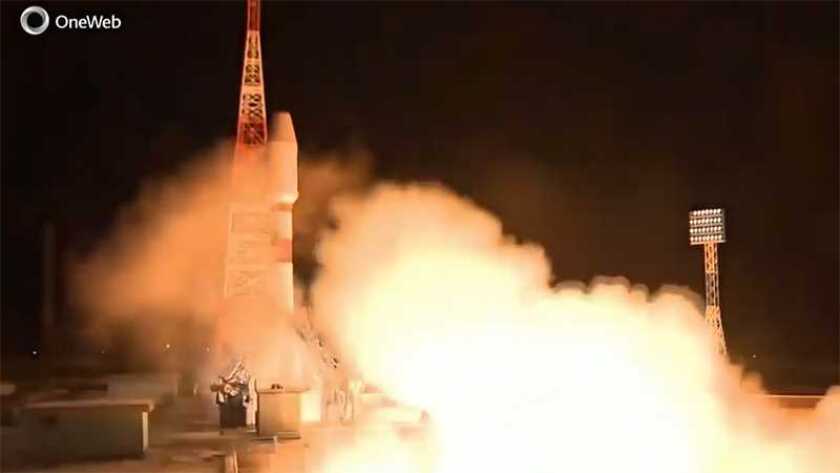The company, backed by the UK government and Indian group Bharti Airtel, has signed up antenna specialist SatixFy to build an aircraft terminal that will work with OneWeb’s low Earth orbit (LEO) and with satellites in geostationary orbit.
Ben Griffin, VP of mobility at OneWeb, said: “OneWeb is confident of its suitability for all aviation applications — commercial, regional, business and government aviation use-cases.”
The announcement comes as French company Arianespace readies the next launch of 36 OneWeb satellites. This is due to take place in the early hours of the morning European time on Thursday 25 March, four months after the previous launch (pictured).
The Soyuz rocket is set to lift from the Vostochny cosmodrome in the far east of Russia with the second payload of OneWeb satellites since the company was rescued from chapter 11 bankruptcy protection last year. If successful, OneWeb will then have 146 satellites in operation — about a quarter of its planned total.
Sunil Bharti Mittal, executive chairman of OneWeb, told Capacity earlier that the company plans a commercial launch covering everywhere between 50°N latitude and the North Pole in October 2021, expanding to cover the whole globe next year.
SatisFy, which has offices in Israel, Bulgaria and the US as well as the UK, said it will develop a new in-flight connectivity terminal in a joint venture, called JetTalk, with Singapore Technology Engineering.
The aim is to develop a product is based on SatixFy’s electronically steered multibeam antenna, that will work with LEO and geostationary satellites for the commercial aviation market.
Griffin said: “This agreement with SatixFy represents a major milestone for OneWeb Aviation, as we plot our path to facilitating onboard connectivity, globally, on commercial airliners and corporate jets, large and small.”
The European Space Agency (ESA) and the UK Space Agency have helped the development. Catherine Mealing-Jones, director of growth at the UK Space Agency, said: “The new aviation terminal will make use of the Prime, Beat and Sx3099 ASIC chips developed with UK Space Agency backing, showing how supporting our most innovative companies leads to results that make a real difference for people all over the world.”
Yoel Gat, SatixFy’s CEO, said: “Aggregating capacity from multiple satellites will give customers the grade of service they expect on flights. This great leap forward is made possible thanks to the continuous support by ESA and UK Space Agency.”






